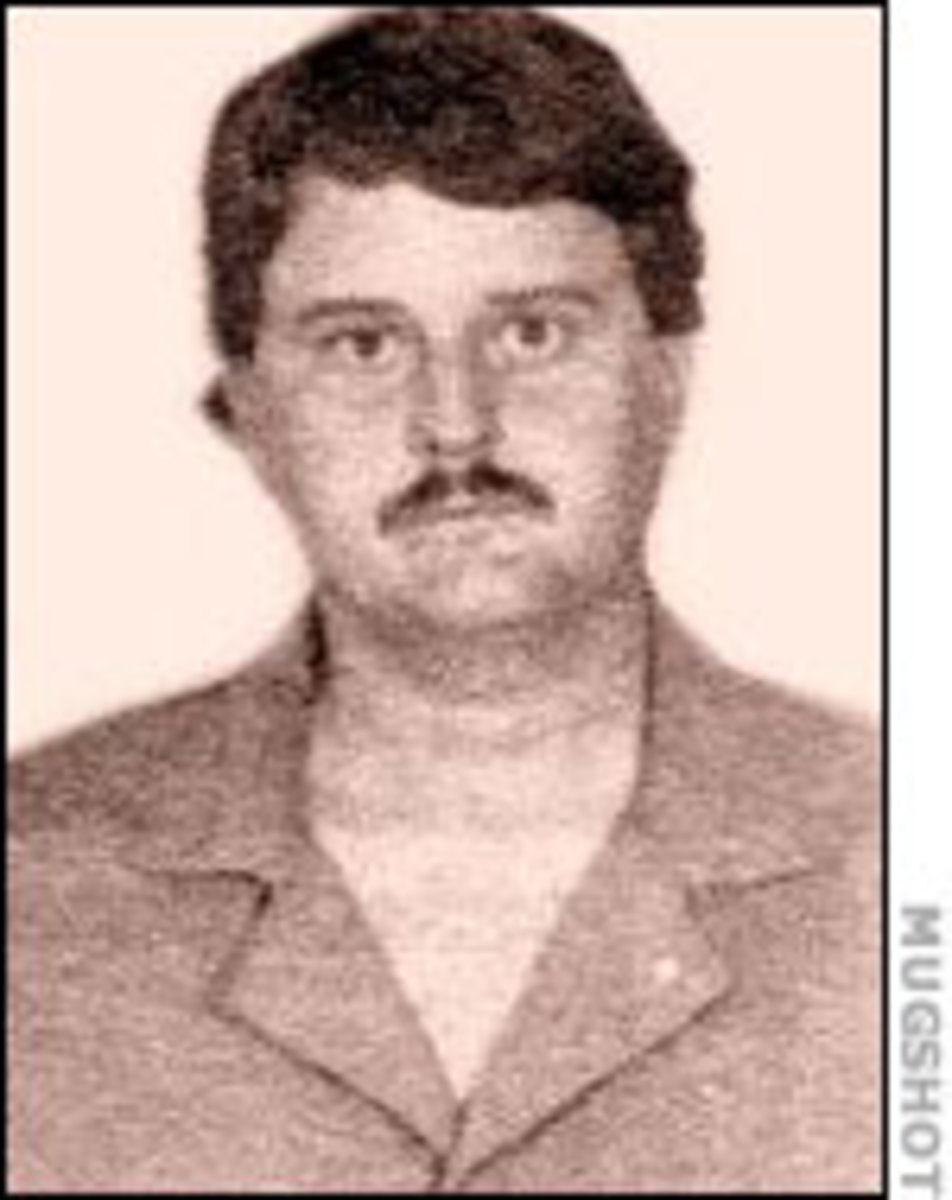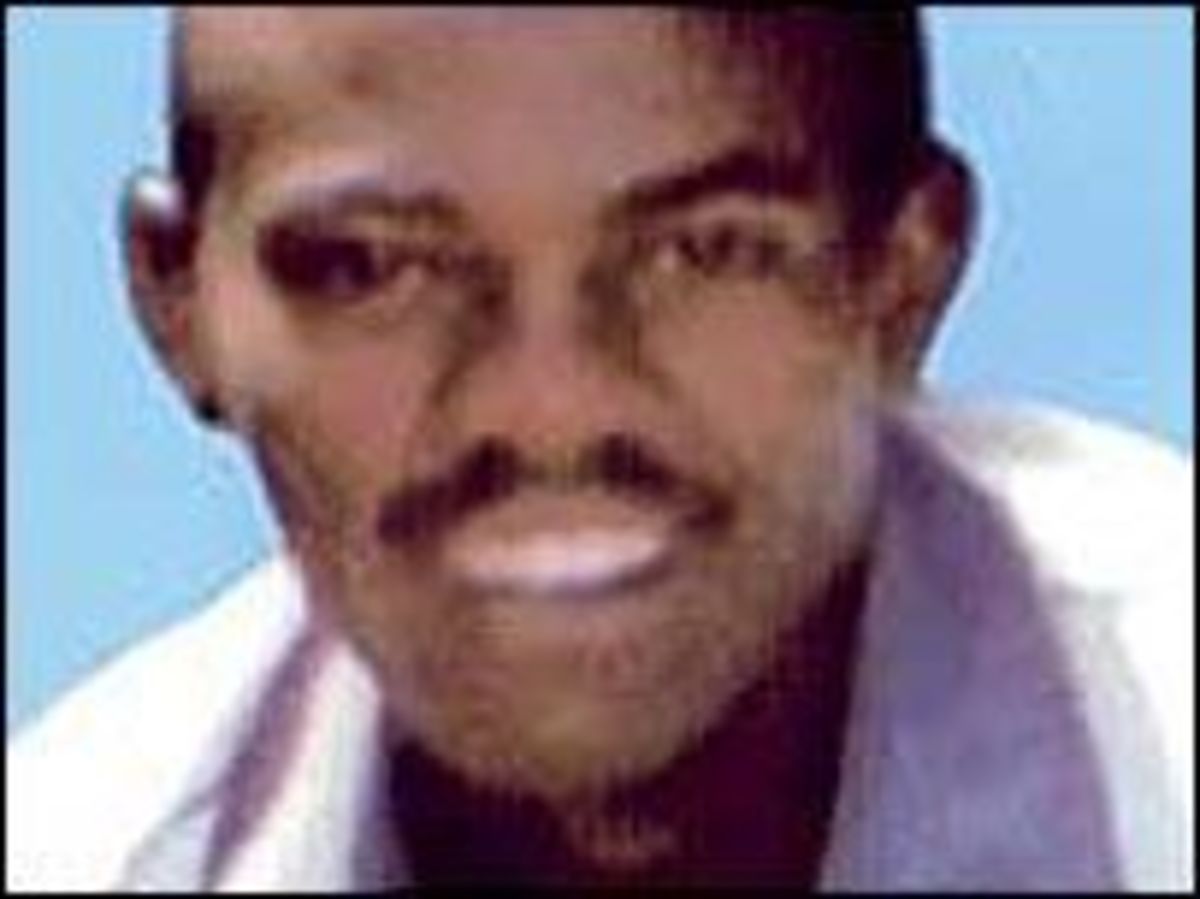The Murder Trial of Mumia Abu-Jamal
Thoughts Are Not Facts
The murder trial of Mumia Abu-Jamal has generated more world wide attention than any other case of a prisoner in recent history. It is a subjective case with new evidence and theories, just as subjective, surfacing day to day.
The only truthful facts of the case are that Daniel Faulkner of the Philadelphia police was murdered while conducting a traffic stop, in the winter of 1981. Jamal, who was also shot in crossfire, was charged with the murder, convicted in a Philadelphia court and has been sitting on death row ever since.
Throughout this time, Jamal and his defense team have cleverly established that he is the victim of criminal injustice, even though all concrete facts point to Jamal being the criminal behind the murder.
Knowing that he is a murderer, Mumia Abu-Jamal has used his imprisonment as a platform to voice his radical political views and discontents of American society, simultaneously manipulating the American public into giving him a new trial.
Radical Revolutionary
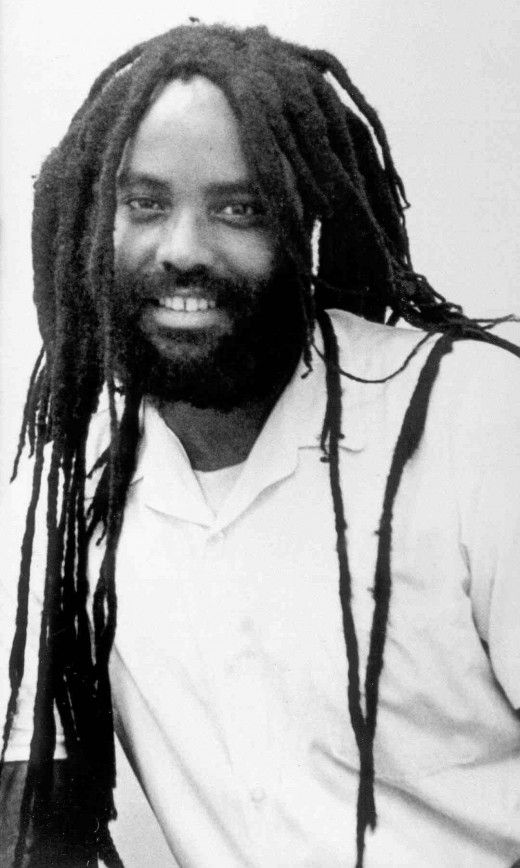
Early Days
Mumia Abu-Jamal has been synonymous with black power and exposing potential corruption within America- more specifically the direct and indirect discriminations he has dealt with from white America. Jamal is quite concerned with the term, "revolution" and, as he stated in an interview from prison, is "not afraid to use that word" (www.freespeech.org-jamal interview).
When Jamal was 14, he was beaten and arrested for protesting a presidential rally for Alabama governor George Wallace in South Philadelphia (Weinglass 270). His radical political views overlapped in the classroom as well. While still in high school, he fought to change its name from Benjamin Franklin high school to Malcolm X high school and was then later expelled for circulating pamphlets calling for "black revolutionary student power" (Weinglass 270).
Poll
Should Mumia Abu-Jamal get a second chance in court?
Black Panther Activism and FBI Surveillance
After being expelled from high school, he assumed the title of co-founder and minister of information for the Philadelphia chapter of the Black Panther Party. He was only fifteen years old at the time. His activism in the Black Panther Party garnered him numerous magazine and newspaper articles throughout Philadelphia.
Simultaneously, the FBI and Philadelphia police began daily surveillance of Jamal, including putting him on the FBI's Security Index (Weinglass 270). Despite this, Jamal's associations propelled him into a successful career in journalism.
Jamal was broadcasted across the country on the National Black Network, Mutual Black Network, National Public Radio and the Associated Press. Jamal also interviewed Julius Erving, Bob Marley and Roots author Alex Haley, basing his journalism on the self-procliamed "...principle that we are oppressed Black human being first" (Weinglass 270).
While his international notoriety increased, law enforcement and the political ring of Philadelphia began to to equally resent Jamal.
Tensions between Jamal and the government of Philadelphia flared up considerably when Jamal covered mayor Frank Rizzo's press conference following a police siege on the black radical group MOVE's central home by more than 600 officers earlier that day. It should be noted that the Philadelphia police was the first police force to be investigated by the national government for abusing their powers (Taylor, S; The American Lawyer; Dec. 1995).
When officer James Ramp lost his life during the crossfire of guns, Mayor Rizzo was quick to conclude that the "new breed of Journalism" was to blame and warned, "..that you're going to have to be held accountable and responsible for what you do" (Kelley, 1998; Philadelphia Weekly p.4).
In the following months, twelve MOVE members were tired, convicted and sentenced to lengthy jail terms for the murder of officer Ramp. Outraged, Jamal began venting his frustration of the situation and Mayor Rizzo's politics on his daily radio show at WUHY in Philadelphia and was eventually fired due to his tirade.
Jamal began to drive a cab to make ends meet; all of his accomplishments in the media had been lost (www.danielfaulkner.com). Throughout his time in prison, Jamal's strong political beliefs have not tapered, thus making him a "political" prisoner. In America today, the term political prisoner in itself is subjective.
Although the term is in common use, there are almost as many definitions of a political prisoner, as there are writers about it (National Minority Advisory Council, 1980; p.5). One explanation for this is that the meaning of a political crime in America is still undefined. American government to this day, denies that any political prisoners are incarcerated right now (NMAC, 1980, p.5).
A Modern Day Folk Hero to Some
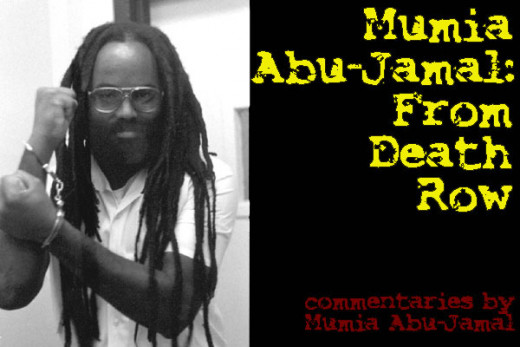
Quick Pre Trial Points
*Jamal was an active member of the Black Panther Party and a successful Journalist
*The Philadelphia Police was the first police force to be investigated for abusing their powers
*Jamal frequently uses the word "Revolution" and, as quoted by him is, "not afraid to use that word"
The "Pro-Jamal" Side of the Argument
From the "Pro-Jamal" perspective and his most recent attorney Leonard Weinglass, what happened to Jamal is considered an abuse of basic human rights. This is how Jamal's defense team perceived what happened at 3:53 am on December 9, 1981: Mumia Abu Jamal was traveling in a taxicab when he saw his brother, William Cook, being beaten by police officers in Philadelphia.
When Jamal went to confront the police officers, gunshots ensued and officer Daniel Faulkner was killed; Jamal was left with a gunshot wound to the chest. Jamal was first beaten severely by the cops, like his brother had been, then taken to the nearby hospital where he was left clinging to his life (Finley, 1995; www.mumia.org).
At the hospital, the police charged him with the murder of officer Faulkner. Despite Jamal's medical condition, his forthcoming case was sped up to be held within the next six months. Judge Albert Sabo felt the need to speed up the case (Weinglass 263).
Upon his departure from the hospital and immediate entrance to jail, Jamal was left with only three weeks to organize his defense.
The Prosecution's Case
The prosecution's case was based on five main witnesses. The first witness was named Cynthia White. Ms. White was a prostitute was thirty eight criminal convictions with three pending (Weinglass 27). Apparently, Ms. White had reached a deal with the Philadelphia police to testify that Jamal was the gunman in the murder of Faulker, if her three forthcoming cases of prostitution were to be dropped.
Other eyewitnesses to the crime, who for whatever reason did not testify, all past lie detector tests claiming that Ms. White was not present at the crime sight (Finley 1995- www.freemumia.org).
The second witness for the prosecution was named Veronica Jones. Like Ms. White, she too was a prostitute who had struck a deal with the police allowing her to continue her profession of being a prostitute if she too gave a testimony similar to Ms. White's. Ms. Jones claimed that Jamal was perched in front of officer Faulkner and then shot him five times.
The third witness for the prosecution, Mark Scanlan, not only misidentified Jamal at the scene of the crime as being the driver of a Volkswagen, but admitted to being drunk and confessing that he "could have been mistaken" about where the events took place to begin with (Finley, 1995 www.freemumia.org).
Another aspect of the prosecution's case was an alleged confession Jamal made at the hospital. The trouble with this alleged confession is that word of it never surfaced until two months after the crime had taken place. The confession, according to the prosecution, was made the night of the shooting. Officer Garry Bell and security guard Priscilla Belle, both friends of Faulkner's claimed to have heard Jamal openly proclaim, "I shot the mother**cker and I hope the mother**cker dies" (Weinglass 33).
The second discrepancy with this confession was that it was never included into Officer Bell's report, nor did Belle report such a confession to the police. Officer Bell could have testified that the confession was made, but he was sent "on vacation" for the duration of the trial, and Jamal's defense was not allowed to subpoena him (Finley www.mumia.org).
The final aspect of the prosecution's case is the physical evidence- the guns. Faulkner was shot by a .44 caliber pistol, while Jamal had a .38 caliber. The prosecution failed to run sufficient gun tests to show whether the gun was recently shot or fired the fatal bullet, or even if they did, the results were harmful to their case and failed to properly report them (Weinglass, New York Times June 1998).
If this were not enough, the prosecution's statement of where the bullet entered Faulkner's body was inconsistent with where Jamal was standing at the time.
Picture Diagram of the Bullets' Trajectory Submitted in Court
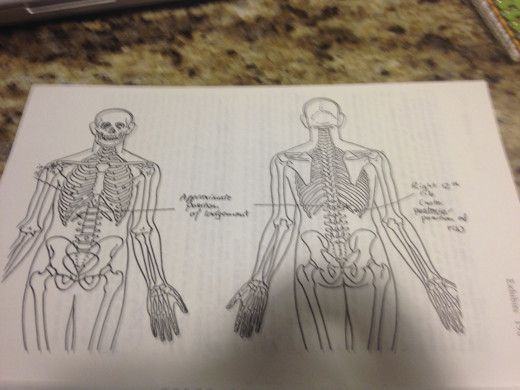
The Courtroom Circus
From the "Pro Jamal" side of the issue, Jamal was denied the right to act as his own attorney and was allocated a mere one hundred and fifty dollars to interview and appoint himself an attorney- Anthony Jackson. The defense also claims that Jamal was banned from the courtroom on numerous occasions in an "unconstitutional" manor (Weinglass 194).
Jamal became increasing hostile towards the courtroom and presiding judge Albert Sabo, who has sent twice as many criminals to death than any other judge in America today (Weinglass 258). Efforts to appoint John Africa, the leader of MOVE, to represent Jamal in court, were blocked because Sabo concluded Mr. Africa lacked proper legal training.
Another aspect that the defense has attacked as unconstitutional is the jury selection. The defense has claimed that "several" jurors were removed from the trial in an illegal manor. Altogether, the defense had compiled nineteen separate trial errors. Despite this, the jury consisting of ten white people and two black people took only four hours to find Jamal guilty and impose a death sentence (Jackson 149).
Regardless if Jamal really pulled the trigger on Faulkner, his sentence is not fair. To be convicted of "Murder One", which Jamal was, is to say that Jamal's murder was premeditated ("Murder One." World Book Encyclopedia 1993 ed.). If Jamal shot Faulkner, he did either for self-defense or to protect his brother and should warrant nothing more than a manslaughter conviction.
Bullet List of the Defense's Facts
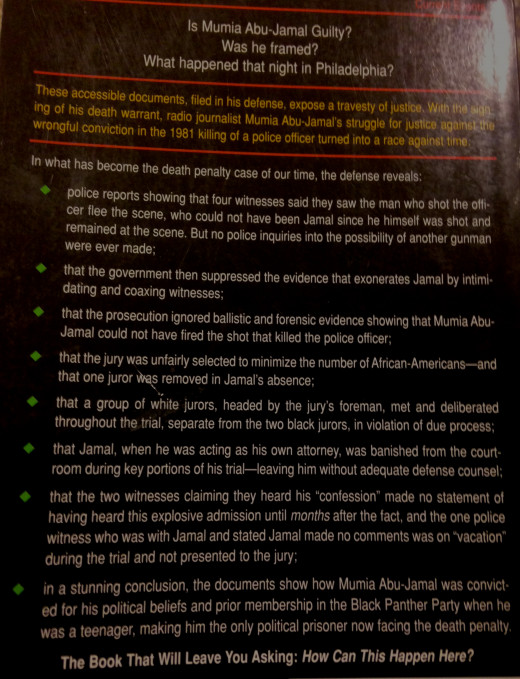
Turning a Blind Eye
The following quote best embodies what the trial of Mumia-Abu Jamal has become:
"If you look today at the movement to save Mumia Abu-Jamal's life what do you find? You find, that there are many people who believe that he is totally and completely innocent, that he is in prison because he is an ex- Black Panther, because he is a MOVE supporter, because of the racism of this country. There are plenty of people who believe just that. But there are others who know about what happened in Judge Sabo's courtroom. And they look at how unfair that trial was, and they know as time has gone on how almost all of those witnesses have recanted. And they look at a trial like that and they say, we don't know whether he is guilty or innocent but we know that was an unfair trial and a trial so unfair can't prove anything. You shouldn't even take someone's license away in a trial like that, let alone put him on death row. And then there are those who simply say the death penalty is wrong and that the killing has to stop" - Robert Meeropol (taken from www.freemumia.org).
The irony in this quote, is that the one who made it is the son of Julius and Ethel Rosenberg, the only two Americans convicted of a "political" crime and sentenced to die.
The "Free Jamal" advocates break down into different categories. A majority of these people are predominantly white, college-educated people who see this case from a surface- see that Jamal is a black man with long dread locks, see his accomplishments in the media, and immediately cry foul.
Officer Faulkner's widow Maureen approached a man once, who was wearing a "Free Mumia" t-shirt. She asked where he had gotten that shirt and he replied, "At a rally at UCLA". When she told him who she was and offered him a fact sheet of the case, he immediately declined. (Mulshine 29).
Other supporters of Jamal, stem from minority groups and conclude that what happened to Jamal is just another example of discrimination in regards to the death penalty which, to a certain extent, is true. Of the one hundred and twenty criminals on death row in a Pennsylvania court at the time of the trial, only thirteen were white (New York Times V.89; p. 53 author-Herb Ray).
But what these groups fail to see, or see and ignore are the concrete facts of the case that incriminate Jamal. Yes, there are many examples and trials which document racism involving capital punishment, but the facts of this case far outweigh those facts.
The Smoking Gun
During the trial, it was concluded that William Cook, Jamal's brother, was the closest person to the murder. Yet the jury never heard Mr. Cook testify in his brother's behalf (www.danielfaulkner.com). The defense claims that Cook had a long battle with drug addiction and that he was "petrified" of the Philadelphia courtroom (Weinglass 185). The defense also states that Cook had disappeared and had not been seen for years ( Weinglass 185).
If this case was anything less than murder, it is relatively understandable that Cook would not want anything to do with it- but it is. His own flesh and blood is on trial and is quite close to losing his life. Now why on earth wouldn't he run to the aid of his brother, if his life was on the line? Jamal's brother's disappearance from this case really hurt Jamal's chances for a new trial.
Although the defense claimed the type of bullet found in Faulkner's body was inconsistent with the type Jamal had on him, facts conclude that the gun found next to Mr. Jamal was owned and registered in his name. Jamal was also found wearing an empty gun holster and his gun contained five spent "Special P" casings, which through a ballistics test, was the same exact bullet found in Officer Faulkner's body.
Leonard Weinglass, who has represented controversial clients such as the Chicago Seven, and the criminal group behind the first World Trade Center bombing attack, may be a skilled lawyer, but there is only so much a person can do to exonerate a criminal.
The evidence that Mr. Weinglass is reaching, at best. He has failed to acknowledge the credibility of the prosecution's top witness Robert Chobert. Mr Chobert had this to say at the 1982 trial when Jamal gave an informal cross examination:
Jamal- "You did see the cop being shot- the man shoot the cop?"
Chobert- "Yeah, I said I did didn't I?"
Jamal- "Well, you sure did. And you saw me in the back of the wagon, didn't you?"
Chobert- "Yes I did."
Jamal- "What made you certain it was the same man?"
Chobert- "Because I saw you buddy! I saw you shoot him!"
Jamal- "You saw me?"
Chobert- "I saw you shoot him, and I never took my eyes off you until you got in the back of the wagon." (06-02-82 TRIAL RECORD p.2.74-5).
But with this witness, like all the other witnesses and physical evidence, there is uncertainty with Chobert's testimony. Chobert's first recorded statement to the police was that the shooter "Apparently ran away", according to a report made that morning by a police inspector (Weinglass 35).
Final Thoughts
The superficial America wants to believe Jamal is innocent. The dreadlocks, the granny glasses- he looks like a white hippie in racial drag (Mulshine 40). To this day however, this case has generated a tremendous amount of support from celebrities and people of influence. In San Francisco, former mayor Wille Brown proclaimed a day in Jamal's honor. In Detroit, Ann Arbor, Cambridge, Massachusetts, and Madison, Wisconsin, resolutions have all been passed calling for a retrial.
Unfortunately, the hype of the Mumia Abu-Jamal murder case has become far greater than the case itself.
People are ignoring the facts, mostly by choice. In other words, people are believing what they want to believe and anything else is wrong.
Mumia Abu-Jamal embodies rebellion against authority. Jamal has come to personify everything this is wrong with American government, when the case is looked upon from the surface. Naturally, an outsider could look at this case with a very heavy heart.
Many believe that Jamal was provoked by the police for years and simply snapped. The theories are as numerous as they are paradoxical. But the fact of the matter is he murdered a law enforcement official.
Jamal had given heavy foreshadowing of his strong and violent tendencies through his writings and statements like, "Political power grows from the barrel of a gun" (www.danielfaulkner.com).
And even if Jamal were ever to gain a retrial from the Supreme court, chances are his unwarranted celebrity status would distract from the facts of this case, similar to the O.J. Simpson murder trial.
His platform of beliefs will keep him alive indefinitely, possibly for the duration of his life. But to execute Jamal, even though proven to be just and constitutional, would launch America into escalated racial tensions for years to come.
Works Cited
Print Media:
Weinglass, Leonard. "Race for Justice". Common Courage Press. 1995.
Taylor Jr., Stuart (December 1995). "Guilty and Framed". The American Lawyer.
Chinosole. "Schooling the Generations in the Politics of Prison" 1996.
Mulshine, Paul "Free Mumia?" www.frontpagemag.com. August 1, 1995.
World Book Encyclopedia. "Murder One" 1993, ed.
Web Resources:
www.danielfaulkner.com
www.freemumia.org
www.mumia.org
www.nmac.org
www.philadelphiaweekely.com keywords "Kelley" "Mumia"
www.freespeech.org

